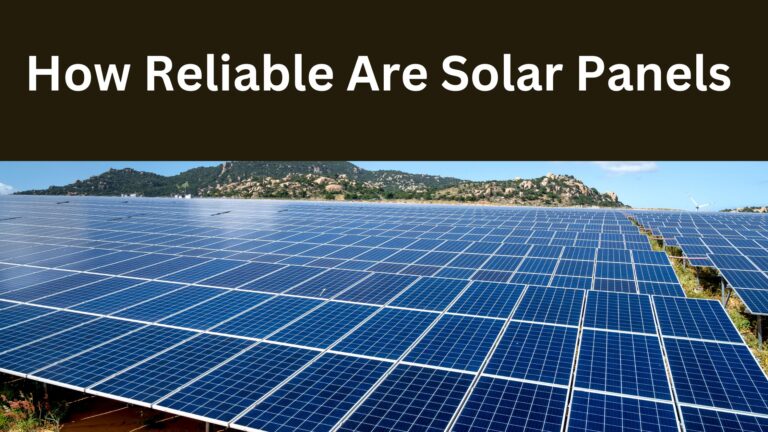Are Solar Panels Recyclable?
As the world continues to become more environmentally conscious, the use of solar panels as a source of clean energy has become increasingly popular. Solar panels are a renewable energy source that can help reduce our dependence on fossil fuels and decrease greenhouse gas emissions. However, with the increasing use of solar panels, questions about their end-of-life management have arisen. Are solar panels recyclable? Can solar panels be recycled?
Solar panels are devices that convert sunlight into electricity. They are typically made up of photovoltaic cells, which absorb sunlight and generate an electrical current. Solar panels are a renewable energy source, which means they don’t produce greenhouse gases, unlike traditional energy sources such as coal and oil. By using solar panels, we can reduce our reliance on fossil fuels and decrease our carbon footprint.
In addition to their environmental benefits, solar panels can also save homeowners and businesses money on their energy bills. Once installed, solar panels can produce electricity for up to 25 years, making them a long-term investment in sustainable energy.
What Happens to Solar Panels at the End of Their Lifespan?
Like all technology, solar panels have a limited lifespan. After 25 years or so, solar panels begin to lose their efficiency and must be replaced. But what happens to old solar panels once they are no longer usable? This is where the issue of solar panel recycling comes into play.
Recyclability of Solar Panels
The short answer to the question “Are solar panels recyclable?” is yes. Solar panels are made up of several components, including glass, silicon, and metal, all of which can be recycled. However, recycling solar panels is not as straightforward as recycling other materials, such as aluminum cans or plastic bottles.
Unlike aluminum cans or plastic bottles, recycling solar panels is (more complex) due to several factors. First, solar panels are composed of various materials like glass, silicon, and metals, requiring separation for individual processing. Second, some older models may contain hazardous materials that necessitate specialized handling. The constant evolution of solar panel technology further complicates recycling as different types require different methods. Lastly, the industry’s relative youth means there are fewer recycling facilities equipped to handle these materials. With ongoing research.
Advancements in Solar Panel Recycling Technology
In recent years, advancements in technology have made it possible to recycle more of a solar panel’s components. For example, a process called thermal recycling can recover up to 95% of a solar panel’s glass and metal components. In this process, the solar panel is heated to a high temperature, which separates the glass and metal components from the silicon.
Another technology that has been developed for recycling solar panels is called mechanical recycling. This process involves shredding the solar panel into small pieces, which are then sorted by material and recycled. Mechanical recycling can recover up to 85% of a solar panel’s materials, including silicon.
The Challenges of Recycling Solar Panels
Despite these advancements, there are still challenges to recycling solar panels. One of the main challenges is the cost of recycling. Currently, it can cost two to three times more to recycle a solar panel than to manufacture a new one. This means many solar panels end up in landfills instead of being recycled.
Another challenge is the need for more infrastructure for recycling solar panels. There are currently only a handful of facilities in the world capable of handling large-scale solar panel recycling, which means that many end up being shipped to countries with less stringent environmental regulations.
The Importance of Proper Disposal and Recycling of Solar Panels
Proper disposal and recycling of solar panels are important for several reasons. First, it helps to reduce the amount of waste that ends up in landfills. Second, it recovers valuable materials that can be used to manufacture new products. Finally, it helps to reduce the environmental impact of solar panel production and disposal.
The Role of Manufacturers in Promoting Solar Panel Recycling
Manufacturers play an important role in promoting solar panel recycling. By designing solar panels with recyclability in mind, manufacturers can make it easier and more cost-effective to recycle old solar panels. For example, manufacturers can develop solar panels that are easier to disassemble and use fewer different materials. In addition, manufacturers can work to create a network of recycling facilities around the world to make it easier to recycle solar panels.
💡Also Read, How to Determine the Number of Solar Panels You Need for Your Home
The Future of Solar Panel Recycling
The future of solar panel recycling looks promising. As technology continues to improve, it will become easier and more cost-effective to recycle solar panels. In addition, as more countries adopt renewable energy policies, the demand for solar panel recycling is expected to increase, driving innovation in the industry. For example, several companies are currently researching new methods for recycling solar panels that are even more efficient and affordable.
There are also efforts underway to improve the infrastructure for solar panel recycling. Governments and private companies are investing in building new recycling facilities around the world. This will make it easier for solar panel owners to recycle their panels at the end of their lifespan.
Common Myths About Solar Panel Recyclability
There are several common myths about solar panel recyclability. One of the most common myths is that solar panels cannot be recycled. As we have seen, this is not true. Solar panels are recyclable, and there are technologies available to recycle their components.
Another common myth is that recycling solar panels is not cost-effective. While it is true that recycling solar panels is currently more expensive than manufacturing new ones, this is likely to change as technology improves and demand for recycling increases.
What You Can Do to Help?
If you are considering solar panels for your home or business, there are a few things you can do to help promote solar panel recycling. First, choose a solar panel manufacturer that is committed to sustainability and is designing solar panels with recyclability in mind. Second, ask your solar panel installer about how they dispose of old solar panels. Finally, stay informed about the latest advancements in solar panel recycling technology.
Conclusion
Solar panels are a valuable source of renewable energy that can help reduce our reliance on fossil fuels and decrease greenhouse gas emissions. However, it is important to remember that solar panels have a limited lifespan and need to be disposed of and recycled properly. By promoting responsible solar panel disposal and recycling, we can help ensure a cleaner, more sustainable future for all.
If you have old solar panels that need to be disposed of, do so responsibly. Contact your local recycling facility to see if they accept solar panels, or look for a specialized solar panel recycling facility in your area. Together, we can make a difference in the fight against climate change.

Solar Energy Engineer, Founder of Solar Panel Guide Blog, and passionate advocate for a sustainable future. ☀️🌿 #SolarEnergy #Renewables Read More About Peter






